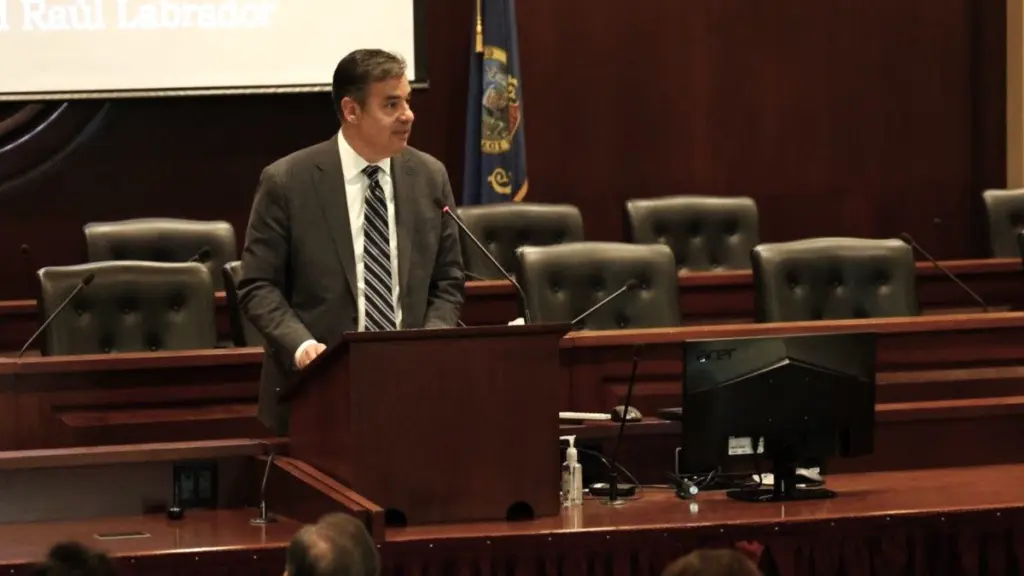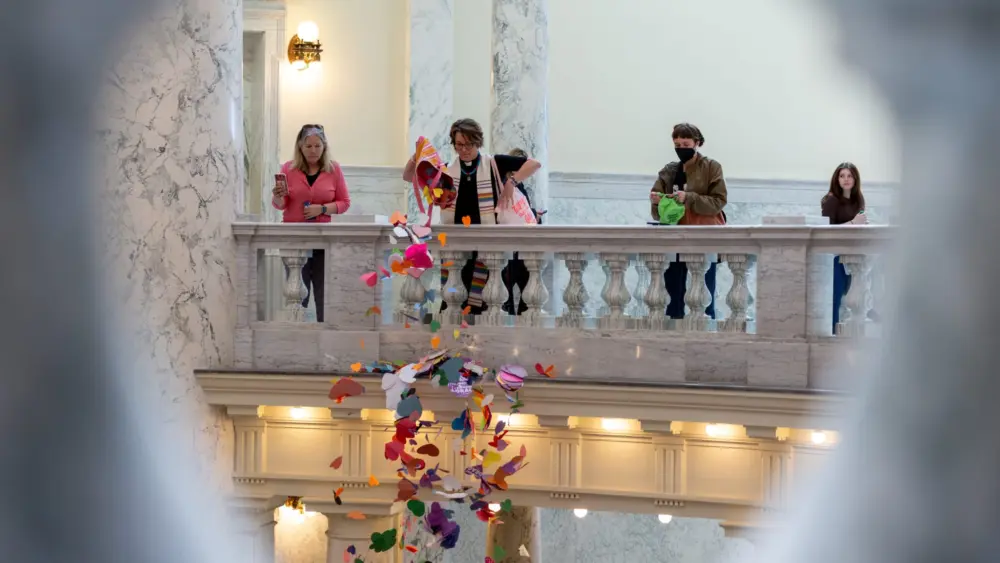BOISE, ID – For a second time, an Idaho judge denied an attempt by Idaho Attorney General Raúl Labrador’s office that sought to prevent him from answering questions in a whistleblower lawsuit by a fired AG’s office attorney.
Idaho 4th District Judge Jonathan Medema on Friday rejected Labrador’s motion to quash the subpoena for his deposition, sought by attorneys for former Deputy Attorney General Daphne Huang in her lawsuit.
In April, the judge partially rejected the Idaho Office of the Attorney General’s motion for a protective order that would’ve also shielded Labrador from answering questions from Huang’s attorneys.
In September 2023, Huang, who previously represented the Idaho Department of Health and Welfare, sued Labrador’s office after she was fired, the Idaho Capital Sun previously reported. She alleged the Idaho Attorney General’s Office retaliated against her after she raised ethical concerns related to her clients’ legal representation.
Judge: ‘Answers can only be provided by the Attorney General himself’
The judge previously limited Labrador’s in-person deposition to last up to two hours. Labrador’s deposition is scheduled for this week, court records show.
“When neither party is providing the Court with testimony from someone other than the Attorney General answering these questions, it is easy to conclude that the answers can only be provided by the Attorney General himself,” Medema wrote in his ruling Friday.
Labrador’s office could not be immediately reached for comment. In a written statement, an attorney for Huang said they look forward to hearing what Labrador says.
“The Court again gave thoughtful consideration to the arguments made by Mr. Labrador and decided that Mr. Labrador must appear to give deposition testimony next week. It’s the right decision,” Huang’s attorney Guy Hallam told the Sun on Friday. “Mr. Labrador is the one who took adverse actions against Ms. Huang and should have to answer questions about why he did so. We look forward to hearing what he has to say.”
Previously, Idaho Attorney General Office’s spokesperson Damon Sidur said the office has maintained Huang’s termination “was based on legitimate, work-related performance issues.”
Huang represented Idaho Dept. of Health and Welfare on scrutinized grants. Judge blocks investigation questions in deposition.
The lawsuit ties back to an investigation the Idaho Attorney General’s Office launched in early 2023 into how $72 million in child care grants were distributed by the Department of Health and Welfare.
Huang wrote legal guidance to Health and Welfare — which Labrador’s office later withdrew — that found the agency’s administration of the grant funds was legally sound. A 2023 state audit found issues in the grant distribution and spending.
Judge Medema also limited the questions that plaintiff’s attorneys can ask Labrador in deposition, including preventing them from asking about “the Attorney General’s thought processes and reasons for his office having undertaken various official actions, what investigations to conduct or not, and what enforcement actions to conduct or not … (and) about his reasons for making certain statements to the press.”
“However, this Court did permit Plaintiff’s counsel to examine the Attorney General about why he chose to fire (Huang) where his office admits he made that decision, not someone else, and the person designated to testify on behalf of the (Attorney General’s) Office could not explain what documentation the Attorney General considered when he made it,” Medema wrote in his ruling Friday.
Labrador’s office also requested permission to appeal the judge’s previous partial rejection of a protective order in the case to the Idaho Supreme Court. The status of that appeal motion is not immediately clear.
Judge rejects Labrador’s attempt to apply higher legal standard that generally shields public officials from deposition demands
Labrador’s office has argued Huang hasn’t met a high legal standard, under an “extraordinary circumstances test,” meant to prevent government officials from being deposed in lawsuits.
“The Attorney General has a duty to serve the people of Idaho, and that work should not be interrupted by a deposition that imposes an undue burden or is not justified under the circumstances,” Idaho Chief Deputy Attorney General Phil Broadbent told the Sun in a written statement before a court hearing early last week.
But the judge wrote even if he used the test Labrador’s office proposed, it wouldn’t have changed the result.
“Because several versions of the extraordinary circumstances test applied by other courts are not fundamentally different than the test this Court applied … and because the result would be the same even if the Court did apply some version of that test, the motion to quash is Denied,” Medema wrote.
Judge sanctioned Idaho AG’s Office for Labrador missing earlier deposition date. AG’s Office says plaintiff’s attorneys knew he was out of town.
The judge also previously sanctioned the Idaho Attorney General’s Office for Labrador’s failure to appear for his previously scheduled deposition — requiring the office to pay expenses related to Labrador’s deposition and Huang’s motion for sanctions.
Hours after the deposition was set to occur, the Attorney General’s Office filed a motion for a protective order that sought to stop Labrador from being deposed.
In legal filings, the Idaho Attorney General’s Office pushed back on that portrayal.
Huang’s attorneys scheduled his initial deposition date on Feb. 14 “without first determining whether the Attorney General was available,” Jim Craig, a division chief in the Idaho Attorney General’s Office, wrote in support of Labrador’s motion to quash the subpoena.
Labrador was already planning to be out of town that day, Craig wrote, and Huang’s attorneys knew that — and that Labrador’s office was planning to submit a legal filing for a protective order that sought to stop his deposition.
“Despite this fact, and despite knowing that the hearing on the protective order was scheduled” in March, Craig wrote, “Plaintiff’s counsel showed up for the February 14, 2025 deposition, knowing full-well that the Attorney General was not planning on attending and would be filing for a protective order. Plaintiff then feigned surprise and asked the Court for sanctions when the Attorney General was not there.”
Huang’s attorney Hallam said state law required Labrador to appear for his scheduled deposition, or before then file the motion for protective order.
“He did neither,” Hallam said. “We expect the Attorney General to follow the rules. So does the Court, which agreed that sanctions were appropriate.”
In October, Huang’s lawsuit is scheduled to go to a jury trial.
This story first appeared on Idaho Capital Sun.





